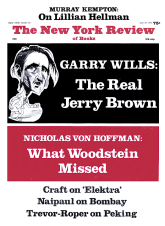In response to:
The Adams' Fall: II from the April 1, 1976 issue
To the Editors:
In your issue of April 1, Gore Vidal, in the second article in his series on the Adams family, makes two obvious historical errors in two successive paragraphs.
Vidal states that “not until the war to preserve the union had gone on for three years did he [Lincoln] free the slaves.” This of course happened in somewhat less than two years (April 1861-January 1963).
Vidal also states that Russell was prime minister at about the time of the sailing of the Alabama for her raids on union shipping. At that time, in 1862, Russell was foreign minister and Palmerston was prime minister.
Fred A. Crane
Bard College
Annandale, New York
Gore Vidal replies:
I count by years not months. Lincoln took office in 1861. He signed the Emancipation proclamation in 1863. To my eye that is a three-year period. Perhaps I should have said, “in the third year of the war.”
There was of course no error in the point I was making. I shall make it again. The civil war was fought, in Lincoln’s own language, to restore and preserve “the national authority throughout the Union” and not, as latter-day Parson Weemses would have it, to free the slaves. Lincoln dragged his feet as long as possible on the issue of emancipation; when he finally came to sign that famous document, he slyly exempted those states that had not seceded but were slave-holding (Missouri, Delaware, Kentucky, and Maryland). The London Spectator got the point to the exercise: “The principle is not that a human being cannot justly own another, but that he cannot own him unless he is loyal to the United States.”
In 1860 Lord John Russell became foreign secretary in Palmerston’s ministry. In October 1865 Lord John became prime minister, serving until June 1866. Charles Francis Adams was American minister at London from 1861 to 1868 and he dealt with Lord John both as foreign secretary and as prime minister. The complicated “Alabama affair” went on for a decade and was not settled until 1872 by an arbitration at Geneva in which Mr. Adams played an important part.
This Issue
June 10, 1976



